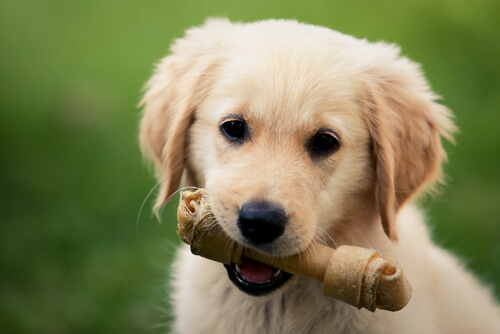Health Alert: Which Foods are Toxic for Dogs?

Toxic foods to a dog
There is a list of toxic foods to a dog that can seriously compromise his health. As responsible owners, it is our duty to know these foods and avoid them at all costs:
- Chocolate
- Onions and garlic
- Alcohol
- Bones
- Sugar, candy, and gum
- Citrus fruits and other fruits with pits
- Milk
Chocolate
Maybe the most well-known toxic food to a dog is chocolate. This highly regarded sweet amongst humans contains theobromine, which can be incredibly toxic to our pet, especially those that are small.

Onions and garlic
Onions and garlic are usually present in the majority of our stews, so many veterinarians advise not giving the leftovers to our pets. These foods, which are very similar to each other, are dangerous since they can lead to anemia and other respiratory problems.
Alcohol
Alcohol is a harmful drug even for human beings. Its effects on our furry friends’ organs can have fatal consequences, which is why giving alcohol to our pets is irresponsible.
Bones
Despite the image that we all have of a dog chewing a bone, they are very harmful. There are great risks for asphyxiation, indigestion, and puncture wounds, especially with bird bones which can splinter like needles.
If you want to reward your dog with a bone, go to your local pet store and ask about nutritious, ready-made foods with that shape. There is a wide variety that are specifically designed for them.

Sugar, candy, and gum
We must prevent our pet from ingesting sugar, especially when it is present in processed candies. Giving sugar to a dog is a mistake that could lead to serious problems like diabetes or blindness. In the case that he ingests gum, the risks are even greater because it contains xylitol.
Citrus fruits and others that have pits
Citrus fruits in general are harmful for dogs, and oranges and lemons are especially so because they contain psoralen. In fact, dogs tend to avoid these fruits because of their acidity.
With regard to fruits with pits, we must be especially careful with melons and apricots, since besides the risk of asphyxiation, the pits in these fruits contain cyanide.
Milk
Only human beings have the ability to consume lactose as adults. The enzyme that allows us to drink milk is not present in dogs, a reason for why we must avoid giving lactose products to our pets.
The list could go on and on. Therefore, the best thing that we can do as responsible pet owners is consult our veterinarian about the most appropriate food for our pet. You should only give specifically designed pet food to them.
This text is provided for informational purposes only and does not replace consultation with a professional. If in doubt, consult your specialist.